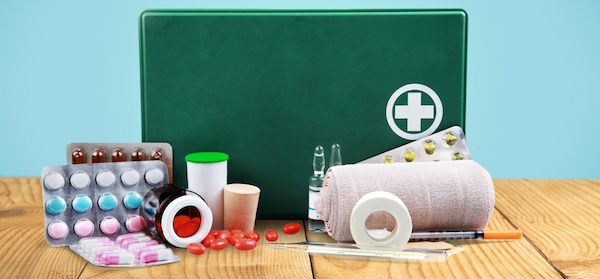Save money by making your own travel first aid kit to take away with you. Our simple steps and handy checklist will ensure you don’t forget anything.
Find a suitable bag
The size of your ideal first aid kit will depend on how long your trip is for, and how likely you are to be injured or become ill during that time.
A weekend away at a resort won’t call for much more than a small bag with the essentials listed below, but if you’re heading off for a four-week camping trip in the Amazon, you’ll want a much bigger first aid kit.
A hard plastic container will make for a good first aid kit; you’ll want a sturdy container so you won’t have to worry about it breaking during your trip. Old tackle boxes or Tupperware containers are good options. You can also purchase a basic first aid kit and then make some adjustments to its contents.
Bonus tip: for long trips, consider bringing both a large and small first aid kit. You can take the small one out for day trips and then replenish its supplies from the big one, which can be left behind at the hotel or campsite.
First aid kit checklist
Basics:
- Adhesive bandages (Band-Aids) – bring plenty of them in all shapes and sizes
- any prescription medicines, remember to check the legalities of travelling with medication and try to bring extra
- antiseptics – essential for cleaning wounds and disinfecting objects
- bandages/gauze
- instant cold packs
- painkillers
- pen and paper – it can be vital to have a way of recording symptoms, times and other details of an incident
- safety pins
- small pair of scissors
- sunscreen
Next up are some more specific items to take with you. You may know from previous experience which items you are likely to need, but as always it’s better to be safe than sorry.
- Anti-diarrhoea medication e.g. Imodium – while it’s best to avoid taking these as they can prolong bouts of diarrhoea, you may sometimes want, or need, a break from the diarrhoea, for example whilst taking busses, trains or planes
- antihistamines
- clean syringes
- eye wash
- gloves
- motion sickness medicine
- oral rehydration salts – essential if you’re travelling to a location where you’ll be more likely to catch stomach bugs, as diarrhoea and vomiting can cause serious dehydration
- torch – if there’s anything that can make a bad situation worse, it’s darkness
- water purification tablets – for some remote areas this is a must.
Location specific
Think about where you’re going, what you’ll need and what could go wrong. For example, you’ll need plenty of blister treatment supplies if you’re going hiking, whereas for a cruise you may need lots of motion sickness medication. Check your location to see if insect repellent, anti-malaria medication, or similar, will be necessary.
Check with your doctor
As always you should check with your doctor before you go away, with an intimate knowledge of your medical history and any pre-existing health problems, they’ll be best suited to inform you of exactly what you’ll need to take on your journey.
Disclaimer: this information is of a general nature and not to be mistaken for professional advice from a healthcare professional.
Related articles:
Five tips for healthy travel
Solo traveller safety

